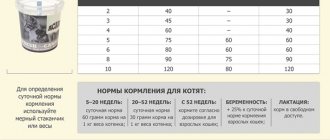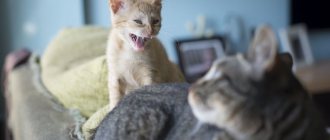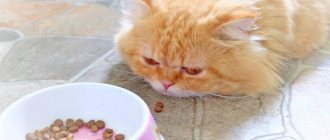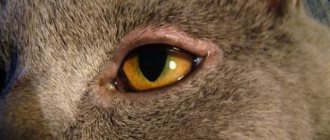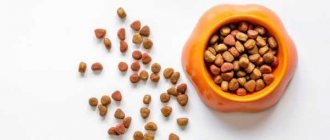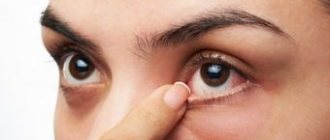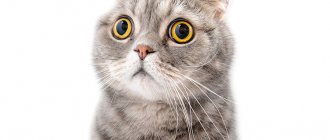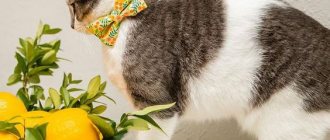There may be several reasons for decreased appetite in cats:
- physiological, related to the natural functioning of the body;
- pathological (medical) related to health status;
- reasons related to feed quality;
- reasons related to the behavior of the owners.
Let's talk in more detail about each group.
Feed quality
Food, including dry food, is made from meat, but there is no way to preserve all its properties forever. Dry diet granules are treated with vitamin E; this is a useful and reliable preservative, but its validity period is limited and is approximately equal to the shelf life of the feed. Then the fats in the “drying” begin to decompose. The cat hears an unpleasant odor, feels a rancid taste and refuses to eat. The taste of canned food and spiders deteriorates in the same way after the expiration date. The answer to the question “why doesn’t the cat eat the food” can often be found in the “use before” line.
The food is not suitable for the cat
As we noted above, a cat's appetite is controlled by its sense of smell. A cat, like any predator, needs meat, and he determines how much of it is in a product by smell. If the food smells like grain, you shouldn’t be surprised at your pet’s poor appetite. Persuasion will not help here: cats act according to their instincts, which allowed them to survive in the harsh conditions of the wild.
Signs that the food is not suitable for your cat:
- The cat always ate this dry food reluctantly, but now he has stopped altogether;
- the diet contains little meat and a lot of grains;
- there are no animal fats in the food: they are partially or completely replaced by vegetable oils;
- the ingredients are named in groups with general words, for example “meat and its derivatives”, “offal”, “poultry meal”, which indicates the low quality of the ingredients used.
Solution
Carefully study the composition of the product you feed your pet. We wrote earlier about what good cat food should be like. If the composition turns out to be unsatisfactory, the diet will have to be changed to a higher quality one.
Improper storage
Dry food loses flavor if kept outdoors. If your cat does not eat dry food that you bought in bulk, it may well be that the store did not carefully close the bag. For the same reason, you should not buy a year's supply for your pet: there is a high risk that you will have to throw away half of it. Opened canned food will only take a few hours at room temperature to become unusable. If you see that the cat has stopped eating wet food and has gone about his business, it is better to put the bowl with the leftovers in the refrigerator.
Temperature
In the wild, cats eat their prey while it is warm. Indoor cats don't like cold wet food either. Also, the consistency and flavor changes after being refrigerated.
A cat may well agree to eat food from a freshly opened pack, but refuse food from the refrigerator.
Before cooling, the gravy of the canned food or pouch is a nice, tasty liquid that coats all the pieces. The cat has a desire to eat the entire portion.
When you take wet food out of the refrigerator, the gravy becomes thick and congealed. In addition, the pleasant aroma disappears. This type of food is not attractive to the cat.
Tip 1: Heat the food until the liquid consistency and stronger aroma returns
Tip 2: Store the remaining food in an open package not in the refrigerator, but in a bowl of cold water. To keep the water useful longer, add a couple of pieces of ice to the bowl. This will keep the food fresh throughout the day without losing its texture or flavor.
When to urgently contact a veterinarian
You can expect the condition to normalize on its own only if the cat feels well. Intervention is not required if the reason for refusal to feed is mild stress, selectivity or disruption of the daily routine. However, if uncharacteristic symptoms appear and prolonged fasting (more than 2 days for an adult cat, more than 6–12 hours for a small kitten), you must contact a veterinarian for examination.
An urgent visit to the clinic is mandatory in the following cases:
- The cat became dehydrated. It may appear due to vomiting, nausea, or refusal of water. The last symptom is the most alarming, since it indicates serious problems with the functioning of internal organs. Dehydration can kill your pet in a matter of hours due to blood thickening, so you should immediately contact your veterinarian for intravenous fluids. At home, it is allowed to inject Ringer-Locke solution into the withers, but it is better to first find out the cause of the ailment.
- The cat lies in one place, tries to stay closer to heat sources and reacts sluggishly to what is happening. In most cases, this indicates severe malaise and pain. Animals rarely complain of discomfort, since by their standards this is a weakness and can be fraught with death from the paws of another predator.
- The cat is behaving strangely. Sometimes pets meow pitifully, unable to withstand the pain or trying to communicate about it, but this is rare. Due to discomfort, the animal may ask to pet it or, conversely, not allow you to touch the problem area. Cats often become aggressive.
- The animal has a fever. The normal value for adult cats is considered to be +38…+39°C. In kittens, the temperature may be slightly higher - +38.5...+39.5°C. An increase of 1°C indicates the presence of inflammation, but is generally not life-threatening. If the temperature rises by 2°C, you should immediately consult a veterinarian. An increase of 3°C can be critical.
The most dangerous symptoms include vomiting, nausea, inability to empty the intestines or bladder for a long time (more than 2-3 days and 18-24 hours, respectively), disorders of the musculoskeletal system, etc. With itching, rash, For moderate diarrhea without dehydration and other mild manifestations, the cat can wait, but it is better to contact a veterinarian at the first opportunity, since even banal spots on the skin can indicate, for example, liver pathologies.
Whiskers sensitivity
A cat's whiskers are sensory receptors connected to their nervous system. Any movements or touches send signals to the brain.
Some cats don't like their whiskers getting dirty and clinging to the bowl.
When the whiskers touch the food and bowl too often, it results in an overload of sensory messages. The cat may become nervous and lose its appetite. This phenomenon is called “whisker fatigue.”
Here are the symptoms that your cat is experiencing “whisker fatigue”:
- walks around the bowl and meows
- refuses to eat from his own bowl
- trying to get food out of the bowl
- becomes aggressive with food when he takes it out of the bowl
Solution: a wide but shallow bowl that is comfortable for the cat.
What to do
No method convinces your cat to eat wet food and you just don't know what to offer her? Here's what you need to know to change his mind and encourage him to eat.
When your furry doesn't want to go near the bowl of wet food, hope is not lost. There is always a solution. One strategy is to mix food: mixing dry food and wet food is a very effective way to attract your cat's face to food. However, you can add some of the sauce she likes to the food in the bowl to tempt her even more.
Flavoring his dish is a great remedy for his demanding palate. When changing the jar or bag, we try to add cat broth or sauce to his food, remembering to never use salt or spices that are harmful to his health. You can also choose jars of pate that are tastier and more attractive to your cat, as they have a creamy consistency.
The cat hardly likes to change its eating habits. Keep in mind that when an event occurs that disrupts his daily routine or his diet, in most cases there is distress or distress involved. If in any doubt, advice from a veterinarian is always useful and necessary. Together with a specialist, you can understand and help the cat in the best possible way.
Signal of malaise
Refusal of the usual food may indicate poor health of the animal and the development of a particular disease.
The danger of cheap food. For some time, the cat can be quite happy with its diet, regularly eating economy-class dry food. However, low-quality feeds laden with artificial additives have adverse effects, with response times ranging from a few hours to months or even years.
The cumulative negative impact imperceptibly destroys the animal’s body, causing disruptions in the functioning of organs and systems. In particular, cats that eat cheap dry food already at a young age suffer from kidney pathology, urolithiasis, gastritis, pancreatitis, allergic manifestations and skin problems. The worsening of the disease ultimately leads to poor health of the animal, accompanied by a refusal to eat.
Signs of the disease. Unfortunately, mustachioed striped animals are susceptible to a wide variety of diseases, including genetic pathologies, infections, helminthiases, metabolic disorders and all kinds of malfunctions of organs and systems. You can suspect something is wrong if a refusal to eat dry food is accompanied by:
- absolute loss of appetite and aversion to any type of food, including treats;
- increased body temperature;
- noticeable decrease in activity, lethargy and apathy;
- the desire to hide in a dark corner and stay there for a long time;
- drooling, vomiting and intestinal upset;
- copious discharge from the nose and eyes;
- unsteady gait, lack of coordination, convulsions;
- urinary retention, strong unpleasant odor of excreted urine, appearance of blood and pus in urine;
- severe difficulty breathing;
- swelling of the abdomen and limbs;
- the appearance of lumps, tumors and ulcers on the skin and body.
Prevention and treatment. To avoid health-related troubles, you must:
- Treat your favorite cats with suitable natural food or balanced premium and super-premium food that does not contain artificial colors or dangerous preservatives.
- Do not ignore even the most minor ailments of your pet, clearly monitoring his well-being.
- Have the contact details of a competent veterinarian at hand.
- If a particular pathology is detected, strictly follow the specialist’s recommendations, in particular diet and nutritional regimen.
Caring for your pet should be caring and feeding should be rational, which will ensure satisfactory health for many years.
Health problems
A kitten’s refusal to feed often happens for reasons related to the health and well-being of the animal. Here are the most common ones.
- Poisoning.
Cats are by nature very curious creatures, what can we say about little kittens who want to taste everything in sight? It is quite possible that some bad product will come across and cause poisoning in a small cat. In this case, the cat will refuse any product. You should not force-feed him; it is better to take him to a veterinary clinic and show him to a specialist. He will select treatment methods and prescribe rehabilitation therapy. - Disease of the gums or teeth.
A cat may well get stomatitis. Then the food granules will begin to cause pain to the animal, and it will begin to refuse this food. - Helminthiasis.
A kitten, especially if it likes to walk outside, can very easily pick up worms or some other parasites. The owner can visually determine their presence, but it is better to contact a specialist who will conduct an examination and prescribe treatment.
Lack of habit
Most often, a situation where a cat ignores dry food occurs if the animal was not accustomed to this product initially. At the same time, one should not conclude that the cat “considers” it to be unsuitable food; it’s just that, unlike wet foods, dry food smells different and has an unusual consistency.
All you need to do is get your pet used to a dry diet, starting with feeding food that the cat will eat with pleasure (this can be either canned pet food or a natural diet), and gradually adding dry food pellets to it.
At first, they should make up no more than 15-20% of the total serving volume, and then their number is gradually increased until complete replacement. On average, such a smooth transition takes one to two weeks.
If the cat is capricious and leaves dry food granules in the bowl, eating everything else, then you can act harshly by simply depriving the pet of any other food. A hungry animal will sooner or later start eating what is given.
Reasons for refusing dry food
When you notice your mustachioed pet's dissatisfaction, pay attention to specific behavior. Partial refusal to eat, not accompanied by other alarming symptoms, may be temporary.
If the volume in the bowl does not decrease, and the cat experiences severe weakness and apathy, contact your veterinarian. Poor appetite is one of the symptoms of many dangerous diseases. Do not ignore this point, citing the usual pickiness.
Problems with smell
Unlike human receptors, cats are less developed. They perceive taste less well, so when choosing food, cats are repelled by its smell. If you have problems with your sense of smell, even your favorite treats lose their attractiveness.
Poor appetite due to heat, heat, or illness
Another reason for poor appetite is hot weather. At high temperatures, not only humans, but also pets lose interest in food. If your pet lies down most of the time and drinks water heavily, just wait until it gets colder.
The problem can also occur during estrus. The period of sexual heat takes a lot of energy from the pet, so the entire body concentrates on the instinct of reproduction. Other needs are temporarily ignored. Here it is important to observe the absence of other alarming symptoms, since in this case refusal to eat can be interpreted as a sign of pathology.
In case of serious illnesses, there is not just a partial, but a complete refusal to eat. It may be accompanied by fever, gastrointestinal upset and severe weakness. If the sick animal also refuses water, make an appointment at the veterinary clinic as soon as possible. Prolonged dehydration (more than 12-24 hours) can be fatal.
Stress or regime failure
A cat may refuse food due to extreme stress. This often happens when moving, renovating, or adding a new family member.
If your mustachioed pet happily eats handouts and refuses basic food, think about the feeding regime. The lack of a strict schedule and frequent feedings are fraught with overeating and pickiness. By the time of feeding, the cat simply does not have time to get hungry or deliberately ignores the food in the hope of begging for something more tasty.
Rejection of pellets as food
If you have just recently switched your pet to dry feeding after natural feeding, just give him time. The rejection is explained by the less pronounced smell and taste characteristic of ordinary products.
If the cat has been drying for more than a year, check the condition of the teeth. If you have problems with the oral cavity, chewing on hard particles is very painful. In this case, the animal will regularly visit the kitchen and ask for food.
Unsuitable product
This problem often occurs when switching to a higher grade food. Budget brands contain dangerous flavor enhancers and flavorings, while expensive brands contain only natural ingredients.
After poor-quality feeding, the animal needs time to get used to the new diet. In this case, it will be similar to a person trying to switch to a healthy lifestyle after eating fast food for a long time.
Also, the cause of deterioration in appetite may be dissatisfaction with a too monotonous menu. In this case, the diet should be slightly adjusted by adding wet canned food or replacing the existing “crackers” with a different brand.
Damaged product
The taste of ready-made cat food can be ruined not only by the expired expiration date, but also by improper storage. Once the package is opened, the contents quickly oxidize, becoming rancid. Such a product can cause poisoning, so the animal will instinctively refuse it.
Dirty bowl or feeding area
Whiskered pets are very clean. They will not eat from a dirty bowl or eat near their toilet.
In addition to dirt and location, you should consider the material used. Cheap plastic quickly absorbs foreign odors, so the contents of the bowl become unpleasant for the animal. Also, water from a nearby bowl can get into the crackers, turning them into a soggy mess.
The cat refuses to eat
An alarming situation arises when a cat suddenly stops eating familiar food and does not even respond to treats. This may happen for the following reasons:
- Diseases - from toothache and intestinal infections to pancreatitis and kidney failure.
- Medical procedures - loss of appetite is considered one of the side effects of vaccination, and after operations using anesthesia, the cat may not eat for up to two days.
- Changing the situation - rearranging furniture, repairs, moving, traveling. In the last two cases, the cat may also feel sick from motion sickness in a car or plane.
- Psychological problems - stress, lack of attention, conflicts with family members and other pets.
What to do. Consult your veterinarian as soon as you notice changes in your cat's eating habits. The faster you respond to a problem, the greater the chances of a favorable resolution.
The pet got sick and lost his appetite
Lack of interest in familiar food may be due to the pet’s unsatisfactory health due to a pathological process occurring in its body. Various diseases can provoke loss of appetite in a four-legged pet: disruption of the gastrointestinal tract, helminthic infestation, dermatological and dental pathologies, and much more.
Usually, loss of interest in food is not the only symptom of the disease. It may be accompanied by other signs:
- general deterioration in well-being (apathy, lethargy, lack of response to external stimuli, decreased physical activity up to its complete absence);
- change in behavior (anxiety, unmotivated aggression);
- increased body temperature;
- discharge from the nasal passages and eyes;
- deterioration of coat condition (loss of shine, loss);
- sores in the mouth;
- bad breath;
- attacks of nausea and vomiting;
- diarrhea or constipation;
- pallor of the mucous membranes;
- foreign inclusions in feces or urine (mucus, bile, pus), etc.
The listed symptoms are possible, but not required. What to do if your pet shows signs of illness? The only reasonable action of his owner in this situation is to contact a veterinarian. You cannot put off a visit to the veterinary clinic. Refusal of the usual food may signal a dangerous illness. It is necessary to identify the cause of loss of interest in food as quickly as possible and eliminate it.
Cats are demanding about cleanliness, be careful
If a cat stops eating dry food because of dirty dishes, the owner just needs to start paying more attention to his responsibilities.
There is constant talk about the need to maintain a drinking regime when your pet eats exclusively dry food. It is important to keep the bowl clean , wash it regularly, and constantly change the water in the drinking bowl. Feed manufacturers warn about the consequences of violating the drinking regime by making appropriate notes on the packaging.
© shutterstock
